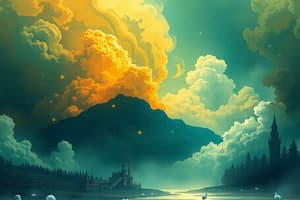Podcast
Questions and Answers
Flashcards
What is a compound?
What is a compound?
A substance that can be broken down into two or more simpler substances by chemical methods.
What is a mixture?
What is a mixture?
A combination of two or more substances that are not chemically bonded.
What is an element?
What is an element?
A pure substance that cannot be broken down into simpler substances by chemical means.
What is a molecule?
What is a molecule?
Signup and view all the flashcards
What is the difference between a chemical change and a physical change?
What is the difference between a chemical change and a physical change?
Signup and view all the flashcards
What is activation energy?
What is activation energy?
Signup and view all the flashcards
What is an exothermic reaction?
What is an exothermic reaction?
Signup and view all the flashcards
What is an endothermic reaction?
What is an endothermic reaction?
Signup and view all the flashcards
What is distillation?
What is distillation?
Signup and view all the flashcards
What is radioactive half-life?
What is radioactive half-life?
Signup and view all the flashcards
What is the carbon cycle?
What is the carbon cycle?
Signup and view all the flashcards
What is the greenhouse effect?
What is the greenhouse effect?
Signup and view all the flashcards
What is the enhanced greenhouse effect?
What is the enhanced greenhouse effect?
Signup and view all the flashcards
What is a base?
What is a base?
Signup and view all the flashcards
What is an acid?
What is an acid?
Signup and view all the flashcards
What is neutralization?
What is neutralization?
Signup and view all the flashcards
What is a polar covalent bond?
What is a polar covalent bond?
Signup and view all the flashcards
What is a hydrogen bond?
What is a hydrogen bond?
Signup and view all the flashcards
What is electronegativity?
What is electronegativity?
Signup and view all the flashcards
What is oxidation-reduction?
What is oxidation-reduction?
Signup and view all the flashcards
What is a galvanic cell?
What is a galvanic cell?
Signup and view all the flashcards
What is the anode?
What is the anode?
Signup and view all the flashcards
What is the cathode?
What is the cathode?
Signup and view all the flashcards
What is a polymer?
What is a polymer?
Signup and view all the flashcards
What is a natural polymer?
What is a natural polymer?
Signup and view all the flashcards
What is a synthetic polymer?
What is a synthetic polymer?
Signup and view all the flashcards
What is cracking?
What is cracking?
Signup and view all the flashcards
What is a fossil fuel?
What is a fossil fuel?
Signup and view all the flashcards
Study Notes
Exam Review Chapters 1-9 and 11-12
- True/False statements: Some true. Some false. Statements about pollutants, air quality standards, and fuel sources are included.
- Check all that apply: Multiple-choice questions. Technological advances that reduce air pollution are examples.
- Multiple-choice: Questions cover various topics in chemistry. Specific examples of elements, molecules, and mixtures are included.
Additional Topics
- Simple substances and mixtures: Substances that cannot be broken down and mixtures. Examples of mixtures and non-mixtures.
- Pure substance vs. mixture: Identification of pure substances versus mixtures.
- Elements, compounds, and mixtures: Identifying components of simple compounds, mixtures, and elements, and other characteristics.
- Diatomic molecules: Diagrams depicting diatomic molecules.
- Atoms and molecules: Diagrams and definitions.
- Subatomic particles: Protons, electrons, and neutrons.
- Elements vs compounds: Identifying the difference between them.
- Atomic structure: Number of protons/neutrons/electrons, characteristics of atomic structure.
- Atomic/molecular differences: Identifying differences between atomic and molecular structure.
- Homogeneous vs heterogeneous mixtures: Examples of each type of mixture.
- States of matter definitions: Definitions of solids, liquids, gases, and plasma.
- Periodic table: Properties and columns/rows are discussed.
- Chemical formulas: Using chemical formulas and symbols.
- Chemical reactions: Balanced chemical equations are included.
- Greenhouse gases: Properties and characteristics of greenhouse gases are included.
- Air quality: Specific pollutants and issues related to air quality.
- Ozone layer: Discussion on the ozone layer, its importance, and how pollutants impact it.
- Chemical changes vs physical changes: Definitions and identification of each type of change.
- Types of radiation: Electromagnetic radiation, wavelengths and energy levels.
- Various compounds: Formulas, structure and properties for various compounds.
- Identifying elements, compounds and mixtures: Practice questions based on elements, compounds and mixtures.
- Molecular and structural formulas: Identifying and classifying various types of compounds and molecules by structure.
- Acids and bases: Properties, classifications, and reactions in chemistry.
- Types of nomenclature systems for compounds: Practice questions regarding chemical compounds and molecules.
- Definitions of terms like moles, molecules, reactants, products, etc.: Important terms associated with chemistry.
Important Facts and Figures
- Most elements in the periodic table are metals.
Studying That Suits You
Use AI to generate personalized quizzes and flashcards to suit your learning preferences.
Related Documents
Description
Prepare for your chemistry exam with this comprehensive review quiz covering chapters 1-9 and 11-12. This quiz includes true/false statements, multiple-choice questions, and identification tasks related to pollutants, mixtures, and chemical components. Test your knowledge on both basic concepts and specific examples in chemistry.




